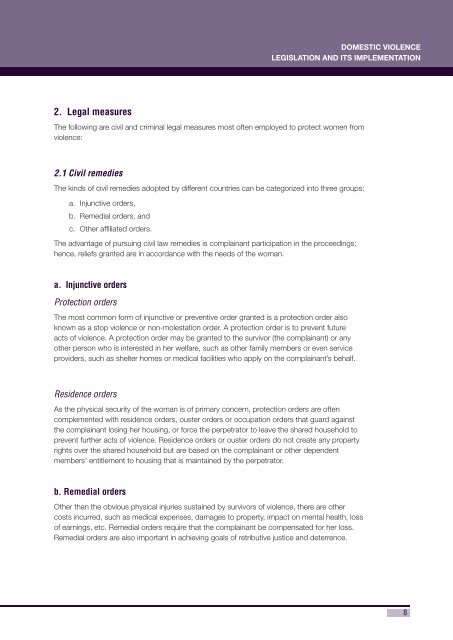Domestic Violence Legislation and its Implementation
Domestic Violence Legislation and its Implementation
Domestic Violence Legislation and its Implementation
Create successful ePaper yourself
Turn your PDF publications into a flip-book with our unique Google optimized e-Paper software.
2. Legal measures<br />
DOMESTIC VIOLENCE<br />
LEGISLATION AND ITS IMPLEMENTATION<br />
The following are civil <strong>and</strong> criminal legal measures most often employed to protect women from<br />
violence:<br />
2.1 Civil remedies<br />
The kinds of civil remedies adopted by different countries can be categorized into three groups:<br />
a. Injunctive orders,<br />
b. Remedial orders, <strong>and</strong><br />
c. Other affi liated orders.<br />
The advantage of pursuing civil law remedies is complainant participation in the proceedings;<br />
hence, reliefs granted are in accordance with the needs of the woman.<br />
a. Injunctive orders<br />
Protection orders<br />
The most common form of injunctive or preventive order granted is a protection order also<br />
known as a stop violence or non-molestation order. A protection order is to prevent future<br />
acts of violence. A protection order may be granted to the survivor (the complainant) or any<br />
other person who is interested in her welfare, such as other family members or even service<br />
providers, such as shelter homes or medical facilities who apply on the complainant’s behalf.<br />
Residence orders<br />
As the physical security of the woman is of primary concern, protection orders are often<br />
complemented with residence orders, ouster orders or occupation orders that guard against<br />
the complainant losing her housing, or force the perpetrator to leave the shared household to<br />
prevent further acts of violence. Residence orders or ouster orders do not create any property<br />
rights over the shared household but are based on the complainant or other dependent<br />
members’ entitlement to housing that is maintained by the perpetrator.<br />
b. Remedial orders<br />
Other than the obvious physical injuries sustained by survivors of violence, there are other<br />
costs incurred, such as medical expenses, damages to property, impact on mental health, loss<br />
of earnings, etc. Remedial orders require that the complainant be compensated for her loss.<br />
Remedial orders are also important in achieving goals of retributive justice <strong>and</strong> deterrence.<br />
8

















